Four students from Notre Dame’s College of Arts and Letters received special honors for their undergraduate research work during the ninth annual Undergraduate Scholars Conference on Friday, April 29. A Glynn Family Honors Scholar in the College of Science and a student in the First Year of Studies were also recognized.
The students received the Undergraduate Library Research Award (ULRA), which recognizes individuals who demonstrate exemplary research skills through their broad use of library resources, collections, services and expertise for their scholarly and creative works. During the ULRA reception, the winners were announced and their research processes and projects were highlighted.
Sponsored by the Hesburgh Libraries and the Center for Undergraduate Scholarly Engagement (CUSE), the ULRA competition honors those who conduct original research and draws focus to the extensive sources and methods of scholarly inquiry that modern-day research libraries offer today’s students. The partnership between Hesburgh Libraries, CUSE, and other campus entities provides students with a network of support and offers inspiration to those beginning original research or capstone projects.
“The Hesburgh Libraries work across every discipline to support the University’s commitment to undergraduate research and scholarship,” said Diane Walker, Edward H. Arnold University Librarian. “Our expertise and services are positioned to build advanced information literacy and research skills that are critical to success both in the classroom and in the world beyond Notre Dame.”
Thomas Lis, history and economics
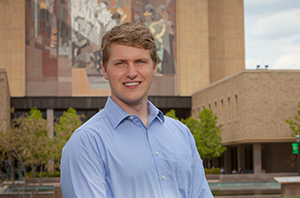 Thomas Lis
Thomas Lis
Lis won first prize in the senior/honors thesis category for demonstrating superlative research skills for his thesis, “The Myth of Locarno: Versailles, Poland, and the Continuity of French Foreign Policy, 1919-1936.” John Deak, assistant professor of history, served as his adviser. A history and economics double major with a minor in European studies, Lis explored the diplomatic cooperation between Western and Eastern Europe within the Franco-Polish alliance of 1921.
His senior thesis challenged traditional interpretations of the dynamic between France and Poland centering around the Locarno Treaty of 1925. Though his research required much hands-on archival work in Europe, Lis’ research process started at Notre Dame. The Hesburgh Library, he said, offered several primary sources, as well as secondary literature. “The generosity of the Twardzik and Zavislak families has led Notre Dame to have one of the most extensive collections in Polish studies. This allowed me to look at a wide historiography on the topic.”
Kelly McGee, Arabic and political science
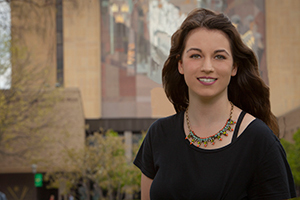 Kelly McGee
Kelly McGee
Honorable mention in the senior/honors thesis category was awarded to McGee, who conducted extensive research for her work, “Faltering ‘Frames of Exception’: Feminist Contestations of Gendered Nationalism via Family Law and Artistic Productions in the Occupied West Bank.” Kelly, an Arabic and political science major, was advised by Atalia Omer, assistant professor of religion, conflict and peace studies with the Kroc Institute for Peace Studies.
McGee analyzed various scholarly conversations to develop a complex explanatory analysis of activism of women in the West Bank. Her research delved deep into Palestinian history and also explored the relationship between gender and family law and Palestinian art. McGee initiated her research project nearly three years ago with books in the Hesburgh Library. When her research took her to the Middle East, she also resourced the Library’s online books and journals and communicated through the “chat with a librarian” service.
Brittany Sanok, international economics and English
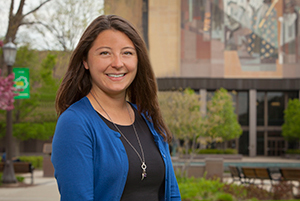 Brittany Sanok
Brittany Sanok
Sanok, the first-place winner in the 20000-40000 category, is an international economics and English double major enrolled in the John Donne and George Herbert Senior Seminar. She was advised by Susannah Brietz Monta, associate professor of English. To fulfill a course requirement to conduct research directly related to the seminar’s topic, Sanok wrote “The Evolution of Death in John Donne’s Holy Sonnets.”
Her ULRA essay demonstrates the iterative process of conducting research, a core information literacy standard. She learned to refine her search string as well as her questions. Sanok used a variety of expertise and resources ranging from online databases to onsite primary source materials held in Rare Books and Special Collections. “The Hesburgh Libraries constitute the virtual and physical space in which I found my sources, analyzed my research and conceived the ideas and words of my paper,” said Sanok. “Notre Dame’s library system permeated every stage of my research and writing process.”
Madeline Cole, history
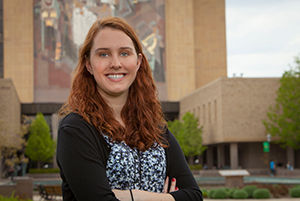 Madeline Cole
Madeline Cole
Cole, honorable mention recipient in the 20000-40000 category, is a senior history major. Her independent research paper, “The Lenore Mooney Papers and The Great War: Conceptualizing the World of an Individual,” was advised by John Deak, assistant professor of history.
Cole is the first scholar to explore The Lenore Mooney Papers, a collection of letters written by an American woman living in Paris and serving as a godmother to soldiers during World War I. Her goal was to examine the social, cultural and political themes of World War I through personal narratives that could define how human beings regard themselves in relation to the world around them.
She credits Julie Tanaka, curator for Rare Books and Special Collections and librarian for Western European History, with guiding her search for primary source materials and providing ongoing advice throughout her process. “The resources allowed me to create my own historical narrative, and to become a contributor, rather than only a spectator, in the historical community,” said Cole. “The research skills I have developed will be instrumental as I continue my academic journey.”
August Bonacci, First Year of Studies
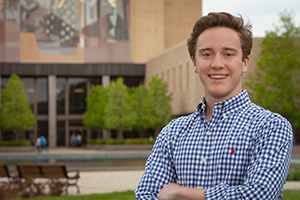 August Bonacci
August Bonacci
Bonacci, a First Year of Studies student, took first place in the 10000 category. He grappled with the topic of a possible solution both to climate change and energy demands, namely thorium-based nuclear energy. Bonacci’s paper is titled, “Generation IV Reactors: A New Hope.” He was advised by Michael Westrate, program director in The Graduate School and concurrent assistant professor in history and in the University Writing Program.
Bonacci explored the challenges facing modern civilization in balancing increasing energy needs with sustainability, environmental concerns and climate change. His research synthesizes vast resources that offer new hope for politically and economically viable solutions.
He credits the library instructor of his Writing and Rhetoric Multimedia class and Visual Resources Curator, Denise Massa, with introducing the Libraries’ web page library.nd.edu, the Pot O’ Gold Information Literacy Tutorial, and the Remix Digital Resource Portal. He learned about concept mapping that helped him become more proficient with search strings. He mined bibliographies and notes and learned that searching is a process of strategic exploration.
Madeline McKenna, neuroscience and behavior
 Madeline McKenna
Madeline McKenna
McKenna, a Glynn Scholar who majors in neuroscience and behavior and minors in science, technology and values, wrote her Honors Foundations of Theology term paper to examine homosexuality prohibitions in Old Testament law. Her adviser was Gary Knoppers, the John A. O’Brien Professor of Theology.
McKenna writes in her ULRA essay that her exploration of this topic was spurred by the Supreme Court decision allowing same-sex couples to marry. In her paper, “Homosexuality Arguments in Leviticus,” she seeks to apply rigorous academic scrutiny and to create “a truly objective argument.”
Her research required careful attention to and analysis of a wide range of both print and electronic primary and secondary sources. While some sources proved obscure and difficult to access, she was able to find them in the Reference Collection within the Hesburgh Library. “By the end of my project, I had directly referenced 20 sources and spent time consulting at least 10 more. My research investigation and subsequent analysis forced me to think far outside of my comfort zone,” said McKenna.
For more information on the Undergraduate Library Research Award and the 2016 winners, visit library.nd.edu/ulra.
Originally published at news.nd.edu.


